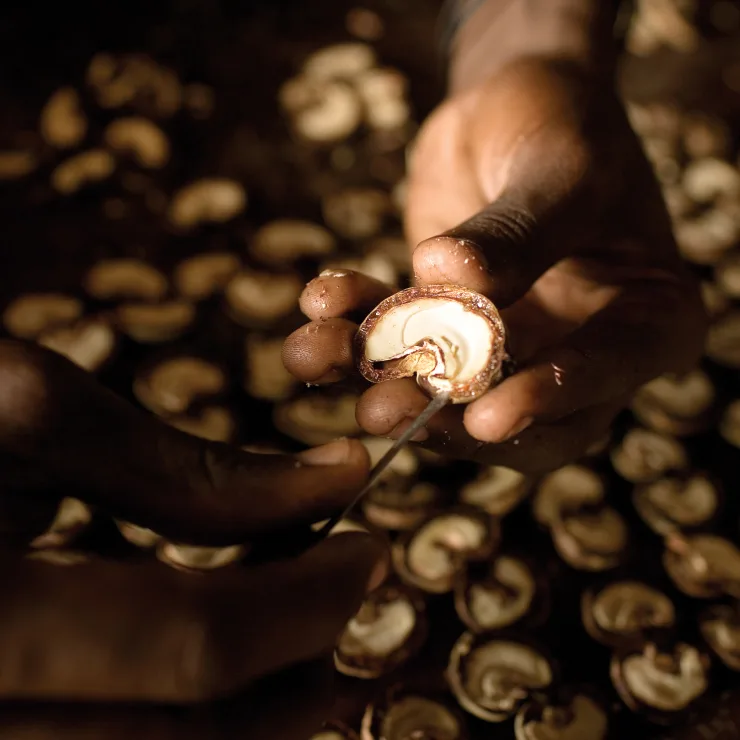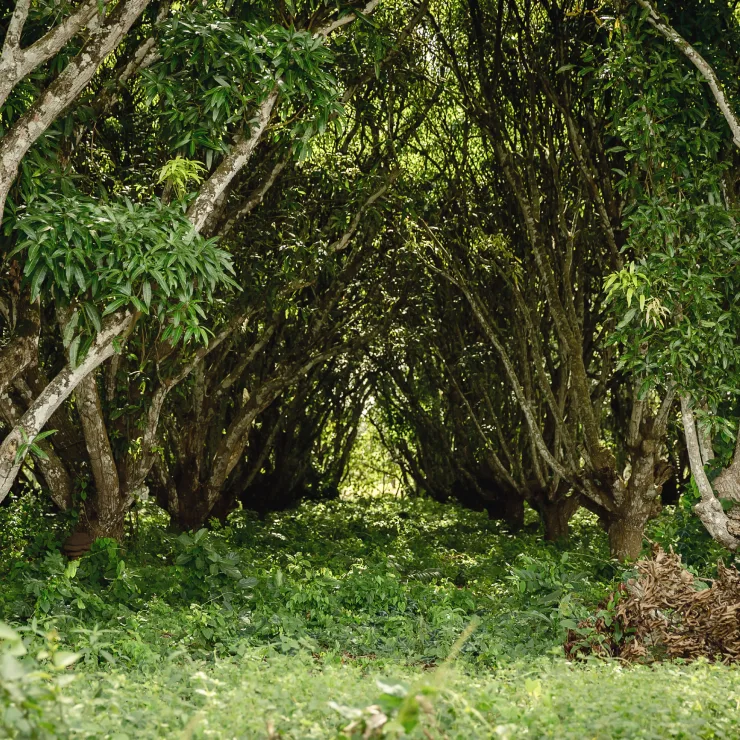Collaboration
We believe in the power of partnership. Together, we can create cashew-based innovations that delight, grow businesses and make a real impact for people and the planet.
Whether it's the creamily thick dollop of depth in a smoothie mix, adding crunchy texture to an energy ball or creating flavorful depth to a sauce, there’s something about the subtle butteriness of cashews that makes it a great partner for iconic flavor combos. Which means it deserves the very best treatment to shine. That's where we come in.
We pride ourselves on offering a reliable, year-round supply of high-quality cashews sourced from trusted growers. This consistent, dependable supply means you can count on us to keep your production line running smoothly. Enjoy the feel-good buzz of being a part of sustainable sourcing practices. All dished up with a focus on quality and reliability.
Compared to other nuts, cashews offer a milder taste and softer texture. Their unique balance of sweetness and nuttiness makes them versatile enough to be swirled, dripped and ladled into both sweet and savory dishes to take their taste and feel to the next level. That kind of ingredient is too good not to enjoy all year round.
That’s our job. As one of the only fully integrated cashew supplier in most major producing and processing regions, we offer a year-round, reliable supply of high-quality cashew products. Get consistent, traceable ingredients, from raw to roasted. Or value-added options like cashew butter, flour and any way you need them.

Cashews in whole or piece formats can boost a wide range of applications thanks to their multifunctional qualities. Whether you're adding cashew pieces to breakfast cereals for that nugget of nutrition or topping desserts with roasted cashew pieces for extra wow, you can enhance both flavor and texture with a protein-rich side-serving too.
Our cashews are available in organic, dry roasted, oil roasted, unsalted, salted, blanched, pasteurized and seasoned varieties. Choose from whole, splits, large and small pieces (diced/chopped).

In Vietnam, Côte d’Ivoire and Nigeria we run fully mechanized cashew processing facilities that operate under superior safety and hygiene parameters.
Across Asia and Africa, we have more than ten cashew processing and packaging facilities, which can meet the quality, food safety and traceability standards of our customers.
We offer customized cashew whole grades and ingredients, as well as Kosher and Halal certified cashews. We are the largest processor in origin with pasteurization capability and validated 5-log reduction.
With all of our facilities being Hazard Analysis Critical Control Point (HACCP) and Brand Reputation through Compliance Global Standards (BRCGS) certified, we provide our customers with traceability to international standards.

Our vision is one where cashew farmers and workers in both Africa and Asia earn enough to support their families, everyone has access to education and opportunities and where the natural world is protected. Our 2030 goals outlined in our Nut Trails are helping pave the way for a fairer and more resilient supply chain. You can see them in detail here. Cashew Trail Report (PDF)
Having built strong, long-term relationships with farmers and cooperatives across both continents since 1989, we are able to offer fully traceable Organic and Fairtrade cashews. Our dedicated teams work closely with farming communities year-round, striving to deliver high-quality crops and timely insights, which helps reduce the risk of supply disruptions for our customers.
We’re dedicated to increasing farmer yields, improving the livelihoods of thousands of households and providing fair premiums to those who need it most. To track our progress, we’ll rely on data to monitor our supply chain, tailor our interventions and measure our impact. This will be managed through AtSource Plus, a sustainable sourcing solution that can provide traceability to a product's origin and transparency on key supply chain sustainability challenges through data and insights. It enables customers to map their unique sustainability journey, monitor performance and partner to create impact through targeted interventions. It can be used to improve monitoring efficiency, enhance due diligence with external assurance, and improve compliance with evolving industry standards.
AtSource empowers customers to realize their individual sustainability priorities and achieve positive change from the ground up.
By 2030, we aim to have 100% of our direct cashew volumes traceable to the farmer group level through AtSource Plus, supporting a sustainable future for all involved.

#
No. 1 cashew supplier in the world*
households in Asia and Africa whose livelihoods we’re aiming to improve by 2030*

smallholder cashew farmers we’ve supported so far in Africa and Asia, with initiatives such as donating robust seedlings to launching health campaigns and constructing boreholes*
* Numbers are subject to change

Co-create
Ready to work on something delicious? Whether it's a silky cashew milk for plant-based beverages, a creamy base for dairy-free lattes or a savory sauce formulation with strong plant-based credentials, our food scientists and R&D team are ready to support your next product launch.
We believe in the power of partnership. Together, we can create cashew-based innovations that delight, grow businesses and make a real impact for people and the planet.
We’ll bring our global expertise, nut ingredients, expert people and solutions—while you provide the ultimate ingredient: your brand.
Kosher
Organic
Fairtrade
Vegan
Brand Reputation through Compliance Global Standards (BRCGS)